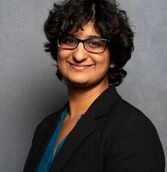Alumni Profile: Kari Neumeyer (Medill ’01)
Northwestern alum Kari Neumeyer tells stories of the ecosystem management practices of Indigenous tribes and governmental agencies in the state of Washington
Last year, the Institute for Sustainability and Energy at Northwestern University (ISEN) formalized a partnership with World Wildlife Fund (WWF)—one of the world’s leading environmental organizations. The collaboration has leveraged faculty and student expertise, producing numerous joint initiatives that span a wide variety of disciplines and geographies. Together the institutions have explored laws protecting Arctic species, ecosystem impacts of infrastructure development in Myanmar, and sustainable building construction in the developing world, to name a few.
This summer, the partnership provided an embedded experiential learning opportunity for Sruthi Darbhamulla (Medill ’19), a graduate student at Northwestern’s Medill School of Journalism, Media, Integrated Marketing Communications. Situated in WWF’s Green Headquarters in Washington, DC, Darbhamulla worked as a member of WWF’s Environmental and Disaster Management (EDM) Program. EDM focuses on disaster risk reduction as well as environmentally responsible recovery and reconstruction. EDM develops global programs that minimize negative environmental impacts from disaster recovery and maximize the benefits that a healthy environment can provide.
ISEN recently spoke with Darbhamulla about her experience at WWF and how it relates to her education at Northwestern.
 What are you studying at Northwestern, and how did you first get interested in this field?
What are you studying at Northwestern, and how did you first get interested in this field?
I graduated on August 31, 2019 with a Master of Science in Journalism from Northwestern’s Medill School of Journalism, where I specialized in editorial journalism. I was always interested in WWF since I was a teenager, as someone who loves green spaces, wildlife, and conservation. Being part of the editorial journalism track meant that I could explore any subject I wanted, and I thought it would be fascinating to explore writing about the environment. It isn’t always easy to write about environmental issues in an engaging way; you can err either on the side of being too technical or too poetic. I wanted to learn how not to do that.
Can you describe your work at WWF? How did it complement your studies at Northwestern?
My internship at WWF started at the beginning of June and continued till the end of August. I was working for the Environment and Disaster Management team. I researched, edited, and reported primarily about nature and nature-based flood management practices. It was more academic than my journalism coursework and made me understand how to cover more niche subjects for a wider audience.
What are some interesting things you came across in your work at WWF? What did you learn that you didn’t know before?
This internship really made me realize how political anything related to water is. I also understood why it floods so much in Washington, DC.
Who are you working with at WWF? What have you learned from him/her?
I worked with Anita Van Breda, the Senior Director of the Environment and Disaster Management Team at WWF-US. She was really great. I learnt a lot about the disaster relief side of WWF, with which I wasn't really well acquainted. She also has a fascinating professional journey.
How does this job fit into your personal interests and future career plans?
Nature, conservation, and wildlife all form a part of my personal interests. I was glad for an opportunity to make it part of my professional experiences as well.